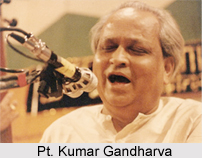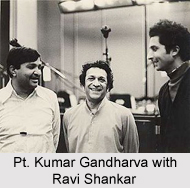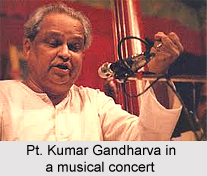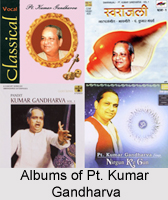 Pt. Kumar Gandharva was a born genius, being declared prodigy since his early years. He used to enthrall and enamour every listener who chanced upon his singing recitals. Listening to his exceptionally mellowed voice, Ustad Faiyaz Khan had gladly agreed to help the young Kumar pursue his dream. Numerous legends and stalwarts were also enamoured by this man`s extraordinary rendition at such a young age.
Pt. Kumar Gandharva was a born genius, being declared prodigy since his early years. He used to enthrall and enamour every listener who chanced upon his singing recitals. Listening to his exceptionally mellowed voice, Ustad Faiyaz Khan had gladly agreed to help the young Kumar pursue his dream. Numerous legends and stalwarts were also enamoured by this man`s extraordinary rendition at such a young age.
He had yet another quality to perfectly emulate the illustrious singers in classical music, and was showered with praises for it. A man of diverse qualities, Kumar Gandharva tasted fame and success at a young age. He was given under the tutelage of Prof. B.R. Deodhar, who made the boy think in a very different manner in the aspect of Hindustani music. The professor made him understand that classical singing was not just a song rendition, but it had a story behind it. In this manner, the student started to think beyond just the four squares of singing. However, after marriage, and in the height of his popularity, he was horribly cut short by an attack of tuberculosis. This cruel sickness forbade him to sing for a long period of time, during which he was engrossed into a very different line of thinking. He was suddenly attracted to folk music of Indian states, and discovered the subtle magic and attraction that it had hidden within itself.  A meticulous person himself, he was dawned with the idea to fuse folk with classical genre. His studied paid off, and the fresh start he made in singing, witnessed his listeners to become astonished once more, with a very different Kumar Gandharva in front of them. His radical thinking and disposition, made him a trend-setter in this newly-established classical musical world. And his every rendition of khayal or bhajan was laced with some innovativeness that surprised every critic each time. His contributions to the musical world are honestly proved to noteworthy and unforgettable.
A meticulous person himself, he was dawned with the idea to fuse folk with classical genre. His studied paid off, and the fresh start he made in singing, witnessed his listeners to become astonished once more, with a very different Kumar Gandharva in front of them. His radical thinking and disposition, made him a trend-setter in this newly-established classical musical world. And his every rendition of khayal or bhajan was laced with some innovativeness that surprised every critic each time. His contributions to the musical world are honestly proved to noteworthy and unforgettable.
Early Life of Pt. Kumar Gandharva
Pt. Kumar Gandharva was born in 1924 in Belgaum district as Shivputra Siddharamayya Komkali. When he was hardly 10, a saintly Lingayat living in the area called him Kumar Gandharva when he heard him sing. As his family was musically oriented, the boy took to learning music with a quickness that astounded many. He was soon hailed as a child prodigy. But, unlike most child prodigies, he did not dry up soon. All through the 1930s, the child prodigy traveled in the company of his father, amazing all with his astounding graps over the niceties of music. In 1936 at the Prayag Sangeet Samiti, Ustad Faiyaz Khan ecstatically said that he would bequeath all he had to help the brilliant lad pursue his training in music. Later at a mehfil in Bombay, he amazed all the connoisseurs and maestros present with his melodious singing. All present in the hall, which included among other Kirana doyens, Hirabai Barodekar, showered the lad with donations and presents.
Later at a mehfil in Bombay, he amazed all the connoisseurs and maestros present with his melodious singing. All present in the hall, which included among other Kirana doyens, Hirabai Barodekar, showered the lad with donations and presents.
Early Career of Pt. Kumar Gandharva
Pt. Kumar Gandharva, while young, with great accuracy and finesse, imitate the voice and style of all the great contemporary singers. What he executed was not mimicry, but a serious evocation of distinct styles. Maestros like Ustad Abdul Karim Khan, Usatd Faiyaz Khan, Pt. Omkarnath Thakur, Sawai Gandharva and Kesarbai Kerkar listened to his replications and congratulated him for faithfully imitating their styles. Young Kumar`s imitations show his precocious ability to assimilate the voice production, rhythmic play and mode of delivery of the maestros. His simulations were the offshoots of his intense admiration for them, as also a tribute to their prowess. Every creative artist goes through such a period of apprenticeship where each adopts or adapts existing styles keeping with the artistic temperament and gifts of each. Creative imitation can well be the most fruitful apprenticeship an artist can have. Pt. Kumar Gandharva was fortunate to be taken under the wing of the scholar-musician, Prof. B.R. Deodhar, a direct disciple of Pt. V.D. Paluskar. Though trained in the Gwalior gayaki, Deodhar was a thoroughgoing individualist, open to the beauties and peculiarities of other styles and approaches. Deodhar trained Kumar to be not just an ace performer, but also to be a theorist and intellectual in the field of music. His unorthodox guru imbued him with a powerful sense of individuality by sharpening his fearless and uncompromising intellect. Thus he avoided getting ensnared in any one style of idiom, but at the same time was open to their aesthetic potential.
Musical Career of Pt. Kumar Gandharva
The iconoclast in Pt. Kumar Gandharva awoke in his early youth during his stint in Mumbai. One day, while singing Raaga Bhimpalas, he was seized by an unusual surge of creative energy which strongly convinced him that he had found his true `voice`. About this time, he fell in love with and got married to his student, Bhanumathi. Being herself a musician, she was, in every sense, a true companion to him. He was slowly gathering success as a concert artist.
 Singing Techniques of Pt. Kumar Gandharva
Singing Techniques of Pt. Kumar Gandharva
Pt. Kumar Gandharva abandoned the traditional unfolding of the Raaga to focus on its melodic centre. In fact, his was a somewhat `de-centred` approach, which followed the promptings of beauty and mood creation and not the logical progression of building of a melodic edifice. Caressing strokes, exquisite melodic passages, and sudden soaring into the upper octave, alternate with carefully punctuated passages of silence in a typical Vilam Bit presentation by Pt. Kumar Gandharva
Award Received by Pt. Kumar Gandharva
Kumar Gandharva was awarded the Padma Vibhushan Award in the year 1990.
Personal Life of Pt. Kumar Gandharva
Kumar Gandharva was married to Vasundhara Komkalimath and formed a memorable duo in bhajan singing.




















